National Farmers’ Day - 23rd December
Introduction
Farmers, the lifeblood of the nation and revered as ‘Annadatas’, are the foundation of India’s prosperity. Their relentless toil feeds the nation, sustains the rural economy, and ensures the strength of every household. National Farmers’ Day, observed on 23rd December, celebrates their invaluable contribution. This day marks the birth anniversary of Shri Chaudhary Charan Singh, India’s fifth Prime Minister, renowned for his deep understanding of rural issues and unwavering advocacy for farmers’ welfare. It is a moment to honour our farmers’ unwavering dedication and recognise their pivotal role in shaping the nation’s progress.

Recognising the vital role of farmers, the Government of India has introduced a suite of initiatives designed to support their socio-economic upliftment and ensure sustainable agricultural growth. These programmes, including the Pradhan Mantri Kisan Samman Nidhi (PM-KISAN), Pradhan Mantri Fasal Bima Yojana (PMFBY), and Pradhan Mantri Kisan Maandhan Yojana (PM-KMY), are aimed at providing financial security, risk mitigation, and long-term social security for farmers. By addressing both immediate challenges and long-term needs, these schemes underscore the government’s commitment to nurturing the backbone of the nation and fostering a sustainable agricultural future.
Role of Farmers in Nation-Building
India’s agricultural sector, employing nearly half of the nation’s population, remains a cornerstone of the country’s economy and a key driver of nation-building. It contributes 17.7% to the Gross Value Added (GVA) at current prices in FY 2023-24. With approximately 54.8% of the country’s 328.7 million hectares classified as agricultural land and a cropping intensity of 155.4% (as per the Land Use Statistics for 2021-22), farmers are the bedrock of this essential sector. Their role extends far beyond mere cultivation; they are the architects of rural development and nation-building, providing food security and sustaining the livelihoods of millions. Through their hard work and innovation, they play a pivotal role in shaping a resilient and prosperous India.
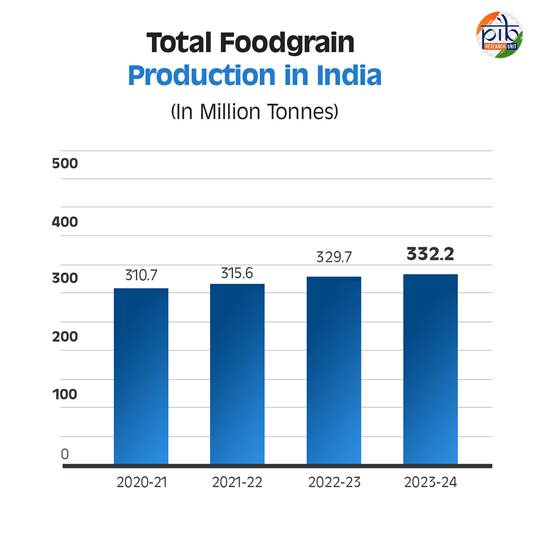
In 2023-24, the country achieved a record total foodgrain production of 332.2 million tonnes, surpassing the previous year’s output of 329.7 million tonnes. This remarkable growth is a testament to the resilience and unwavering dedication of Indian farmers, who have continuously strived to ensure food security for the nation. Their efforts go beyond mere crop cultivation; they are the bedrock of rural livelihoods, shaping the economic landscape of countless communities. The success of Indian agriculture is deeply intertwined with the wellbeing of these ‘Annadatas’, who embody the spirit of hard work, innovation, and sacrifice.
Key Schemes for Farmers in India
Launched over the years, these key agricultural schemes reflect the Government of India's commitment to supporting farmers and enhancing their livelihoods. PM-KISAN, PMFBY, PM-KMY, and other initiatives like the Modified Interest Subvention Scheme (MISS), Kisan Credit Card (KCC) scheme, and Agriculture Infrastructure Fund (AIF) demonstrate a holistic approach to addressing the diverse needs of the agricultural sector. These schemes aim to provide financial assistance, insurance, affordable credit, and infrastructure development, empowering farmers with the resources needed for sustainable agricultural practices and economic security.
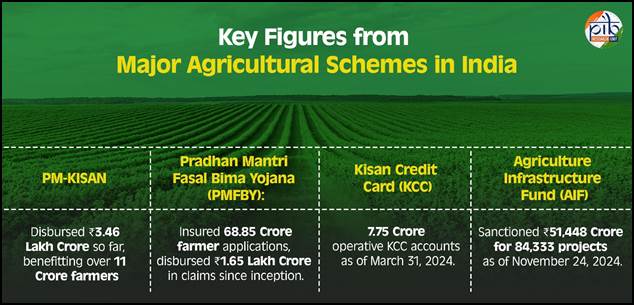
Here are the key schemes for farmers’ welfare in India:
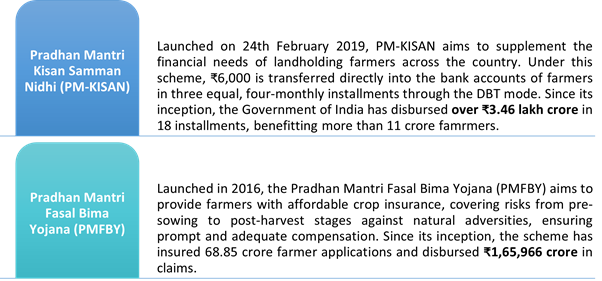
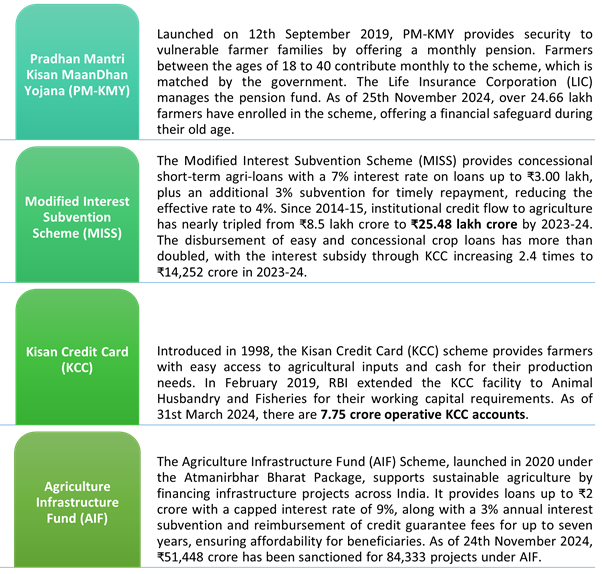
Unprecedented Budget Allocation
Since 2014, the government has significantly bolstered its commitment to agriculture by substantially increasing the budget allocation. In the 2013-14 fiscal year, the Department of Agriculture and Farmers' Welfare had a budget of Rs. 21,933.50 crore. Over the years, this allocation has been raised more than five and a half times, reaching a remarkable Rs. 1,22,528.77 crore for the fiscal year 2024-25.
This unprecedented increase reflects a strategic shift towards prioritizing the agricultural sector, addressing challenges faced by farmers, and ensuring sustainable development. The enhanced budget aims to improve rural infrastructure, promote modern farming techniques, facilitate access to credit, and provide financial support for various agricultural schemes and initiatives. Such a substantial allocation not only fosters farmer welfare but also aims to bolster agricultural productivity and rural prosperity, highlighting the government's unwavering commitment to the growth and development of the agricultural sector.
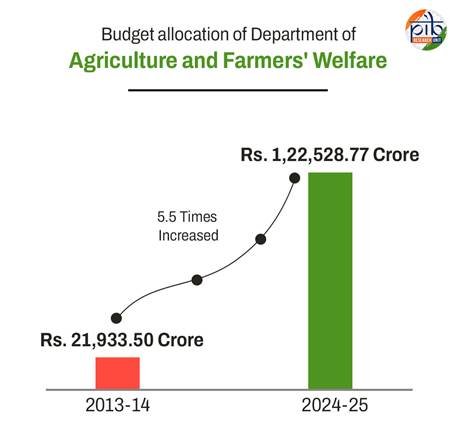
Other Notable Initiatives
Namo Drone Didi: The Namo Drone Didi Scheme, approved for 2024-25 to 2025-26 with an outlay of ₹1,261 crore, aims to empower 15,000 Women Self-Help Groups (SHGs) by providing drones for agricultural rental services, including fertiliser and pesticide application. The scheme offers 80% Central Financial Assistance of the cost of drones, accessories, and ancillary charges, up to a maximum of ₹8 lakh. As of December 3, 2024, ₹141.41 crore has been released for Kisan drone promotion.
Soil Health Card Scheme: Launched in 2015, the Soil Health Card Scheme aims to improve soil health and promote efficient fertiliser use. Over 24.60 crore cards have been issued since launch, with 36.61 lakh generated in 2023-24. A strong laboratory network supports the scheme. In order to develop the soil fertility map, government plans to test 5 crore soil samples by 2025-26.
Formation & Promotion of 10,000 FPOs: In 2020, the government launched a scheme with a Rs. 6,865 crore budget to form and promote 10,000 Farmer Producer Organizations (FPOs). So far, 9,411 FPOs have been formed involving 26.17 lakh beneficiary farmers, aiming to enhance collective farming and improve market access.
Kisan Kavach: On 17th December, 2024, Union Minister Dr. Jitendra Singh unveiled Kisan Kavach, Bharat’s first anti-pesticide bodysuit, designed to protect farmers from the harmful effects of pesticide exposure. This groundbreaking innovation is a major step forward in ensuring farmer safety and empowers the agricultural community through science and technology. The event also marked the distribution of the first batch of Kisan Kavach suits to farmers, emphasizing the importance of safeguarding farmers.

Clean Plant Programme: The Union Cabinet approved the Clean Plant Programme (CPP) on 09.08.2024 with an outlay of Rs. 1,765.67 crore. The CPP aims to enhance the quality and productivity of horticulture crops by providing disease-free planting material, benefiting the dissemination and adoption of climate-resilient varieties with yield enhancement.
Digital Agriculture Mission: The Union Cabinet approved the Digital Agriculture Mission on 2.9.2024 with an outlay of Rs. 2,817 crore, including the central share of Rs. 1,940 crore. This mission is conceived as an umbrella scheme to support digital agriculture initiatives, including creating Digital Public Infrastructure, implementing the Digital General Crop Estimation Survey (DGCES), and other IT initiatives by the Central Government, State Governments, and academic and research institutions.
Credit Guarantee Scheme for e-NWR Based Pledge Financing (CGS-NPF): The Government of India launched the Credit Guarantee Scheme for e-NWR Based Pledge Financing (CGS-NPF) on 16 December 2024, providing a ₹1,000-crore corpus to support post-harvest financing for farmers. Under this scheme, farmers can access credit by pledging their produce stored in Warehousing Development and Regulatory Authority (WDRA) accredited warehouses, backed by electronic negotiable warehouse receipts (e-NWRs).
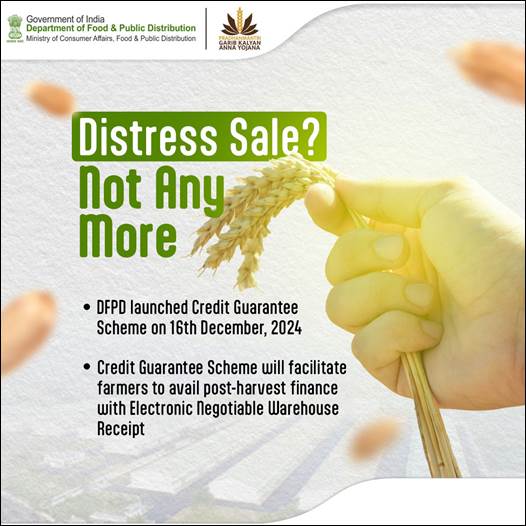
National Mission on Edible Oils – Oilseeds (NMEO-Oilseeds): The Union Cabinet approved the National Mission on Edible Oils – Oilseeds (NMEO-Oilseeds) on 3.10.2024 with a total outlay of Rs. 10,103 crore. The mission aims to boost domestic oilseed production and achieve self-reliance in edible oils, to be implemented over a seven-year period from 2024-25 to 2030-31.
National Mission on Natural Farming: The Union Cabinet approved the National Mission on Natural Farming (NMNF) on 25.11.2024 as a standalone Centrally Sponsored Scheme. The scheme has a total outlay of Rs. 2,481 crore (Government of India share – Rs. 1,584 crore; State share – Rs. 897 crore), focusing on promoting chemical-free, natural farming practices across the country.
Conclusion
The initiatives and schemes introduced by the Government of India are a testament to the unwavering commitment to farmers' welfare and the sustainable growth of the agricultural sector. Through schemes like PM-KISAN, PMFBY, and the Namo Drone Didi, the government not only ensures financial security but also enhances productivity and market access for farmers. The remarkable achievements in foodgrain production, coupled with the expansion of infrastructure and digital initiatives like the Digital Agriculture Mission and the Clean Plant Programme, are setting a strong foundation for a resilient and prosperous agricultural ecosystem. As we celebrate National , it is crucial to continue these efforts, ensuring that the 'Annadatas' remain empowered, secure, and integral to India’s development journey.
References:
PIB
Comments